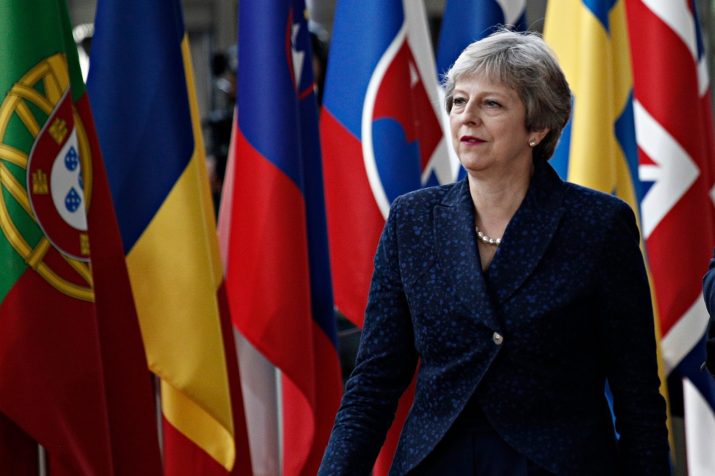

This research article is sponsored by the CES-Glasgow Exchange Program, awarded in collaboration by Glasgow University and the Council for European Studies (CES) at Columbia University.
“In the last decade or so, we have seen record levels of net migration in Britain, and that sheer volume has put pressure on public services, like schools, stretched our infrastructure, especially housing, and put a downward pressure on wages for working class people. As home secretary for 6 years, I know that you cannot control immigration overall when there is free movement to Britain from Europe.”[1] – Prime Minister Theresa May, 17th January 2017.
This quote represents the current British government’s discourse on migration to the United Kingdom (UK). You could argue that the wish to curb immigration was one of the key drivers in the “leave” campaign of Brexit. Yet, the arguments displayed here for limiting the free movement to Britain from Europe, conceivably stem from the 2004 European Union (EU) accession of nine former Soviet-Bloc countries and Cyprus. In that year, the EU grew from fifteen to twenty-five member states, an increase of 66.6 percent. The enormous expansion, under the EU’s free movement of people, led to a conservative media explosion of fear-mongering messages and over-exaggerated migrant numbers. Since then, and dating further back, the UK has taken a suspicious stance towards migrants. This article will discuss the securitization of migration to the UK, especially in the ten years following the 2004 EU accession. In that period, “pressure on public services, like school and hospitals,” as well as “pressures on the job markets or wages,” were some of the most hyped-up anti-immigrant arguments used, mostly against Eastern Europeans. Within that period, the 2008 Financial Crisis caused a notable shift from the traditional sector of security toward the economic sector. in relation to migrants framed as a security threat. Note how the EU accession also inevitably (indirectly) led to the Brexit vote and current turmoil in British politics and immigration policy.
In relation to migration, the 2008 Financial Crisis changed the concept of securitization, which historically describes a political process of the construction of a security threat. It is a concept that was originally coined by the Copenhagen School and academics such as Ole Waever, Barry Buzan, and Jaap de Wilde.[2] Besides coining the concept, they also identified five sectors of security. In the past, (in)security was generally seen in relation to “traditional” militaristic threats. The Copenhagen School caused the security agenda to be “widened” so that it could now encompass the traditional/military sector, but also the economic, environmental, societal, and political sectors.[3] Securitization entails that a securitizing actor, often a political figure, need only to convince its audience that something or someone poses an existential threat for the process of securitization to be a success. That actor can then propose the use of extraordinary measures to combat that threat. With the rapid development of the internet, it has become much easier for anyone to become a securitizing actor. Especially the media and influential individuals have benefitted, in this aspect, from the world’s increased accessibility, connectivity, broadcastability, and instantaneous response possibilities.[4]
For the securitization of migration, the mass migration of people from the MENA region following the Arab Spring, which began in 2010, is a good example. Furthermore, similar anti-immigrant arguments were used in this ‘Migrant Crisis’ by countries that joined the EU in 2004, as were used against their countries in Britain following the Financial Crisis. The manifestations of securitization could be seen in, for instance, tense new discussions about the Dublin Regulation, the law that dictates that refugees have to be processed in the country in which they first entered the EU. Many of the countries in the Mediterranean feared the numbers of migrants arriving and the effect they would have on their countries, especially on the economy and national identity. Furthermore, countries such as Hungary, which lay on the main “refugee route,” decided to build a fence to deter refugees and refused to take part in the “burden sharing,” which was proposed by the EU and promoted by countries such as Germany and the Netherlands. The motivation for Hungary, according to its Prime Minister Viktor Orban was “every single migrant poses a public security and terror risk. For us migration is not a solution but a problem … not medicine but a poison, we don’t need it and won’t swallow it”.[5] This is a prime example of securitization. Hungary did not experience many real “threats” from migrants, as it was simply a country most migrants passed-through. However, the Hungarian population is generally not used to immigrants, or connects the influx of migrants to their problems with Roma gypsies.[6] Therefore, it is easy for Mr. Orban to convince his audience that the migrants would pose a threat to Hungary. A final securitizing motion related to the Migrant Crisis was the heightened fear of terrorists using the refugee route to enter the EU and plot terrorist attacks. This lead to increased scrutiny at the processing centers and heightened awareness throughout the continent. Arguably, the consequences of this event and the subsequent securitization of migrants have led to the increased tensions currently felt between the EU member states and the rise of populism.
Historically, May’s argument could have similarly been used in the post-war reconstruction period of the twentieth century in, for instance, the Netherlands. In the 1960s, guest laborers came from Italy, Turkey, and Morocco when there was a shortage of skilled laborers among the local population.[7] The idea was that as these people were ‘guest’ laborers, they were to return home after making their fortune and when there was less of a demand for them. However, a second wave of immigrants came shortly afterwards, consisting mostly of family members of the first wave and more highly-skilled workers.[8] This indicated that the immigrants were planning to stay for longer. In the ‘90s, it became clear that the initial immigration policies were failing, and immigrants began to be securitized and connected to crime and public disorder.[9]
This is similar to what the UK experienced, following the 2004 EU Accession. However, despite all these instances in relation to migration and the economic and societal sectors of security, academia and the media have written little on the subject. This is especially surprising as a large part of migration is economically motivated. In the years previously mentioned, between 2004 and 2014, two major impact events occurred, which altered the discourse on economic migrants: the A10 EU accession and the 2008 Global Financial Crisis. The UK serves as a great case study country for the manifestation of the securitization of migration in relation to the economic and societal sectors of security, as it has highly divided political parties and media sources, who are not afraid to voice their opinions. As we have seen, the securitization of migration can have long-term implications for International Relations and internal stability and security. Theresa May’s quote fits well with this thesis, as she utilizes arguments in the current Brexit debates that date back to at least 2004.
When analyzing the separate discourses on migrants from 2004 to 2007, and to 2008 to 2012, it is possible to see the effect of the 2008 Financial Crisis in the changing of the discourse. In broad lines and briefly, the 2008 Financial Crisis firstly caused a larger focus on the economic sector as a security challenge in relation to migration. Secondly, the results of research conducted on migrants and the consequences of their movements were highly conflictual, even when researchers were looking into the same thing. This indicated the manipulation of “science” for political gain. Finally, the anti-immigrant discourse was very vague and general following the 2004 EU accession. This changed after the Financial Crisis wherein it became more nuanced and people perhaps began to see the larger picture and (again) the political nature of the issue.
Firstly, the Financial Crisis caused a larger focus on the economic sector as a security challenge. The two figures below display the visual representations of (security) sector focus in 1,715 media articles (from The Daily Mail, Daily Telegraph, Guardian and Financial Times) examined on migrants from the two time periods. The articles were not just looking into migrants as explicit potential security threats, but include all articles on migration, immigration, or migrants, as securitizing language is often not used explicitly. Furthermore, it was necessary to get the entire picture of what was said on migrants – positive, negative, or neutral – in order to uncover the securitizing discourse.

The pie-charts show that there was a substantial reduction of articles relating migrants to traditional threats, such as terrorism and transnational crime, and that there was a large increase of articles relating to the economic sector, following the 2008 Financial Crisis.
In 2004, one month prior to the accession, for instance, the Daily Telegraph wrote that “ineffective immigration policies could increase the threat of a terrorist attack in Britain.”[10] At the time, these kinds of messages were accompanied by for instance the guardian reporting that “the facts have not stopped a frenzied media campaign which has unnerved the government against opening Britain’s borders to workers from the new Europe.”[11] This quote refers to the publishing of over-exaggerated immigrant number predictions, prior to the accession. Furthermore, the heightened immigrant numbers are connected to economic fears of “job stealing” and lower wages, and societal fears like a lack of integration and a loss of “British identity” or: “Britishness.” This was the discourse that more or less continued all throughout the research period (and still prevails today), except there is now less talk of terrorist threats linked to migration. This is also partially because many terrorist attacks in Europe in recent years have been committed by so-called “home-grown” terrorists.[12]
The use of migrants as a scapegoat for economic and societal issues did increase following the 2008 Financial Crisis, despite all of the newspapers examined reporting, at some stage or another, that migrants had little effect on the economic turmoil, and that Britons’ employability is also down to their “lack of motivation and skills.”[13] The anti-immigrant discourse, in general, was that the economy and community cohesion needed to be protected from immigrant numbers. The conservative newspapers published that migrants were especially putting low-skilled and young workers out of jobs, and putting pressure on the public services, such as hospitals, schools, and council housing.[14] As Chris Huhne, former Liberal Democrat parliamentarian and economist, explained in a personal interview conducted with him, these worker groups are always hit hardest whenever there is an economic downturn, and it is easy for migrants to be given the blame due to the timing and circumstances of the issue. The real problem in this case, as described by Mr. Huhne, was in fact the decline of traditional working communities and their sense of feeling left behind, which caused discomfort with “others,” which was then utilized by (far) right-wing politicians as a fuel for anti-immigrant discourse.[15]
Secondly, the research conducted and published on the migrant numbers and the consequences of immigration were highly conflictual. It became clear that the government had no census on the immigrant rate, which was actually one of the largest issues. Critics of the government argued that it was impossible to deal with the ‘issues’ around migration, as the scope of the issue was unknown. From the moment the A10 accession was announced, the conservative newspapers were publishing estimates of the migrant numbers on a weekly basis. One of the most extreme prognostics was when the Daily Mail estimated that 1.6 million new migrants were coming, six weeks after the accession. The Guardian clarified the ridiculousness of this, by stating that 1.6 million new immigrants would equal the entire population of Estonia and more.[16] The more liberal newspapers also tended to publish migrant-numbers, which were all, at best, estimates. However, the frequency of these forever changing numbers was lower.
A notable and influential actor in the whole debate around migration in this period was the thinktank Migration Watch. Often the prognosed numbers published by the right-wing newspapers were based on research conducted by Migration Watch.[17] It is a so-called independent and non-political thinktank, that was established in 2001 and lobbies for “sustainable levels of, and properly managed, immigration.”[18] However, critics of the thinktank said that it is in fact “a right-wing pressure group or lobby group” masked as a non-biased thinktank,[19] and that the (incorrect) findings of Migration Watch led to a problematically polarized debate on migration.[20] Besides the migration rate, the thinktank also published findings like “migrants only contribute 4 pence to the British taxpayer’s pocket,”[21] and “the social costs of migrants are far higher than any benefit they may bring.”[22] Furthermore, a prime example of conflictual “facts” was when The Daily Telegraph published on one day that “immigration had little or no impact on the number of unemployed people in Britain,”[23] and accordingly published the next day that “immigration had kept Britons out of jobs, especially during the economic downturn.”[24] This just shows how difficult it must have been for the public to actually grasp the situation and probably led to increased confusion and dissatisfaction with both immigrants and the government. It is also arguably an early clear example of the age of “alternative facts,” which we now seem to be in.
Thirdly, the anti-immigrant discourse evolved from a very generalist and vague discourse to a seemingly more nuanced one, following the Financial Crisis. The same trend was also seen in the precise use of securitizing language. In the pre-Financial Crisis period, it was more common to directly refer to “threats” or “fears” in relation to migrants. In the post-Financial Crisis period, it was more common to refer to the “issues” around migration and its “negative impact.” Around the time of the 2004 EU accession, the discourse was generally that the number of incoming “Poles and other Eastern Europeans” would be far higher than the country could handle and that the immigration system itself was out of control. These elements both posed economic, traditional, and societal threats to the British taxpayer. This discourse is of course disregarding the dissenting voices and more objective opinions, but it was one of the loudest and most common at the time.
Following the crisis, the discourse remained the same, but with a little more nuance and perhaps political correctness. Economic growth and British society replaced “the British taxpayer” as the things that needed protecting the most. It was deemed that migrants did pose economic threats to certain people (like low-skilled workers and youths), but it was recognized that the issues around migration were part of a larger issue with the government’s dealing of the situation.
Theresa May’s introductory quote includes elements that relate to economic and societal circumstances dating back to at least 2004. Firstly, she mentions the “record levels of net migration to Britain.” This is something that cannot be disputed, despite the lack of a consensus and the conflicting figures. However, the focus on numbers and the net migration rate, rather than actual properly managed immigration, is problematic according to all sources that were examined.
Secondly, the “pressure that immigrants may place on public services like schools and council housing” is a key anti-immigrant argument that can be found in most of the sources. It is disputed by certain parties who suggest that schools with non-English speakers do perform worse, but this is more likely due to other factors like poverty, rather than the lack of speaking English and integration.[25] Furthermore, some sources fight the notion that migrants put pressure on housing, with the argument that any population growth does, and that this argument disregards the exponential population growth of the entire country and all social groups.[26]
Thirdly, the “downward pressure on wages for working-class people” is a difficult topic, as no one seems to know the exact impact of migrants on working-class wages. As discussed, opposite findings on this matter were posted by the same source in consecutive days. Furthermore, the working class is always hit first and the worst in any time of economic downturn. Therefore, they are an easy example to use and tool to gain support for certain policies.
Finally, it is easy to blame the “free movement of people from the EU to Britain” as the sole perpetrator of the above-mentioned issues. However, the second half of this article has displayed that the government, and securitizing actors themselves, recognized their shortcomings in dealing with the situation and the population’s fears that were fueled by the broadcastings of the media and themselves. They also recognized the political nature of what had happened in relation to the dealing of migrants in the ten years following the 2004 EU accession. The 2008 Financial Crisis is an event that changed the securitization of migration and political discourse, from a large focus on the traditional and societal sectors to especially the economic sector. Despite the governments’ recognition of the political nature of migrant handling, they clearly did not learn from past mistakes, as Brexit inevitably happened, fueled partially by the (scientifically unjustified) scapegoating of migrants. In the case of the Netherlands, the migrant “issue” created space for the rise of prominent right-wing politician Geert Wilders. This may be a trend to expect in future, if migration continues to be seen as an issue, and populist politicians continue to channel voters’ fears towards migrants in the economic, societal, and traditional security sense. The main sectoral focus of the anti-immigrant arguments is, however, only to be determined after the next major impact event such as the 2008 Financial Crisis, that can be linked to migration by a future securitizing actor.
Lara Davis is in the process of graduating from her master’s in International Security, Intelligence and Strategic Studies. This is a two-year dual degree program of the University of Glasgow and Charles University in Prague. Over the summer, she spent six weeks with the Council for European Studies in New York as a summer fellow.

This research article is sponsored by the CES-Glasgow Exchange Program, awarded in collaboration by Glasgow University and the Council for European Studies (CES) at Columbia University.
References:
[1] May, T. (2017) “The government’s negotiating objectives for exiting the EU: PM speech”. January 17. Available at: https://www.gov.uk/government/speeches/the-governments-negotiating-objectives-for-exiting-the-eu-pm-speech
[2] See Buzan B., Wæver, O. and De Wilde, J. (1998) Security: A New Framework for Analysis. Boulder: Lynne Rienner, p. 23
[3] Ibid, pp. 7-8
[4] See, for example, Prat, A. (2018) “Media Power”. Journal of Political Economy, ahead of print. 2 July. See also, Weeks, B., Ardèvol-Abreu, A., and Gil de Zúñiga, H. (2017) “Online Influence? Social Media Use, Opinion Leadership, and Political Persuasion”. International Journal of Public Opinion Research, 29(2), pp. 214–239.
[5] See The Guardian (2016) “Hungarian prime minister says migrants are ‘poison’ and ‘not needed’”. 27 July. Available at: https://www.theguardian.com/world/2016/jul/26/hungarian-prime-minister-viktor-orban-praises-donald-trump
[6] See, for example, Escritt, T. (2015) “Hungary’s minorities bear brunt of anti-migrant rhetoric”. Reuters, 1 October. Available at: https://www.reuters.com/article/us-europe-migrants-hungary-roma/hungarys-minorities-bear-brunt-of-anti-migrant-rhetoric-idUSKCN0RV43E20151001
[7] Woude, M., Leun J. and Nijland, J. (2014) “Crimmigation in the Netherlands”. Law & Social Inquiry, 39(3), 560-579.
[8] Ibid.
[9] Ibid.
[10] Helm, T. (2004) “Minister Tripped by Her Tory Shadow Interview”. The Daily Telegraph, 2 April, p. 6
[11] Denny, C. (2004) “Migration Myths Should Not Scare Ministers”. The Guardian, 23 February. Available at: https://www.theguardian.com/business/2004/feb/23/politics.society
[12] See, for example, Dawson, L. L. (2009) “The Study of New Religious Movements and the Radicalization of Home-Grown Terrorists: Opening a Dialogue”. Terrorism and Political Violence, 22 (1), pp. 1-21.
[13] Frost, D. (2006) “Employers are not the villains in the immigration battle”. The Financial Times, 23 July. Available at: https://www.ft.com/content/e20c9626-1a76-11db-848c-0000779e2340
[14] Harris, S., Clark, L. (2006) “Migration flood puts huge strain on schools”. The Daily Mail, 30 September, p. 4
[15] As told in personal interview.
[16] Travis, A. (2004) “Migration will be a trickle not flood, says minister”. The Guardian, 17 June. Available at:
https://www.theguardian.com/politics/2004/jun/17/immigration.immigrationandpublicservices
[17] Doughty, S. (2004) “The myth of how migrants ‘boost’ our economy by 2.5billion a Year”. The Daily Mail, 5 January, p. 19
[18] See https://www.migrationwatchuk.org/about-us
[19] Pallister, D. (2007) “The Numbers Game”. The Guardian, 21 March. Available at: https://www.theguardian.com/commentisfree/2007/mar/21/themarsbarhasa
[20] Muir, H. (2004) “New campaign argues case for migration”. The Guardian, 28 June. Available at: https://www.theguardian.com/politics/2004/jun/28/immigrationpolicy.immigration
[21] Johnston, P. (2007b) “Migrants ‘add 4p a week’ to your pocket”. The Daily Telegraph, 3rd January, p. 1
[22] Johnston, P. (2006a) “Immigrants ‘should be set pounds 27,000 wage target’”. The Daily Telegraph, 29th August, p. 10.
[23] TES (2012) “Immigration ‘does not affect unemployment’”. The Daily Telegraph, 10th January, p. 7
[24] Whitehead, T. (2012) “Migrants kept 161,000 Britons out of jobs, says official study”. The Daily Telegraph, 11th January, p. 12
[25] Cook, C. (2012) “Immigrants have little effect on school standards”. The Financial Times, 18 March. Available at: https://www.ft.com/content/5b779d08-710b-11e1-a7f1-00144feab49a
[26] Finch, T. (2010) “Let’s take immigration seriously”. The Guardian, 6 January. Available at: https://www.theguardian.com/commentisfree/2010/jan/06/lord-carey-declaration-population-migration
Photo: Brussels, Belgium on Jun. 28, 2018. Prime Minister of the UK, Theresa May arrives for a meeting with European Union leaders | Shutterstock
Published on October 2, 2018.




